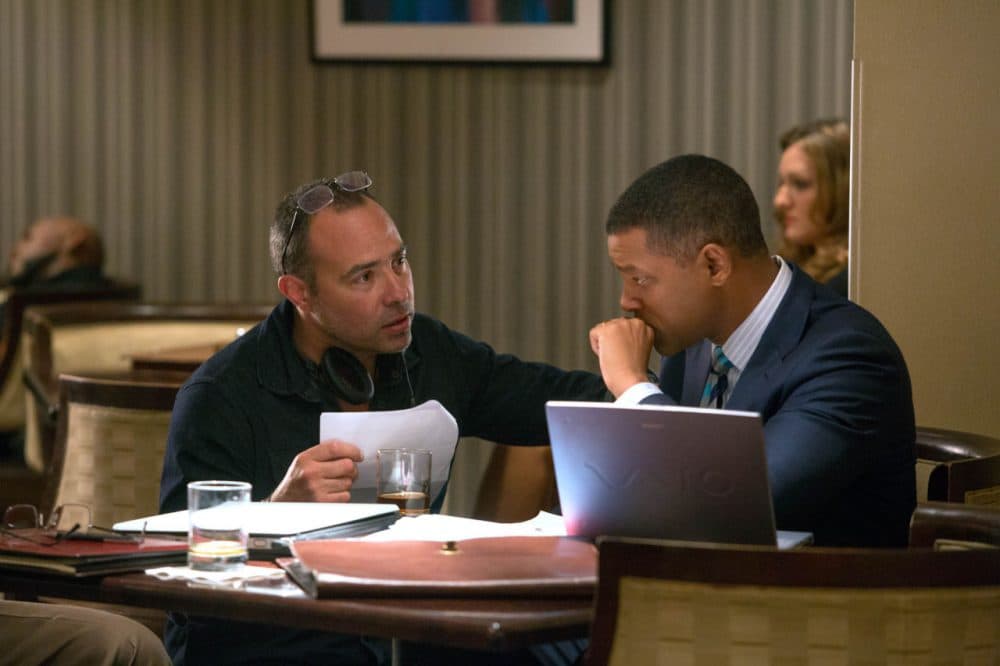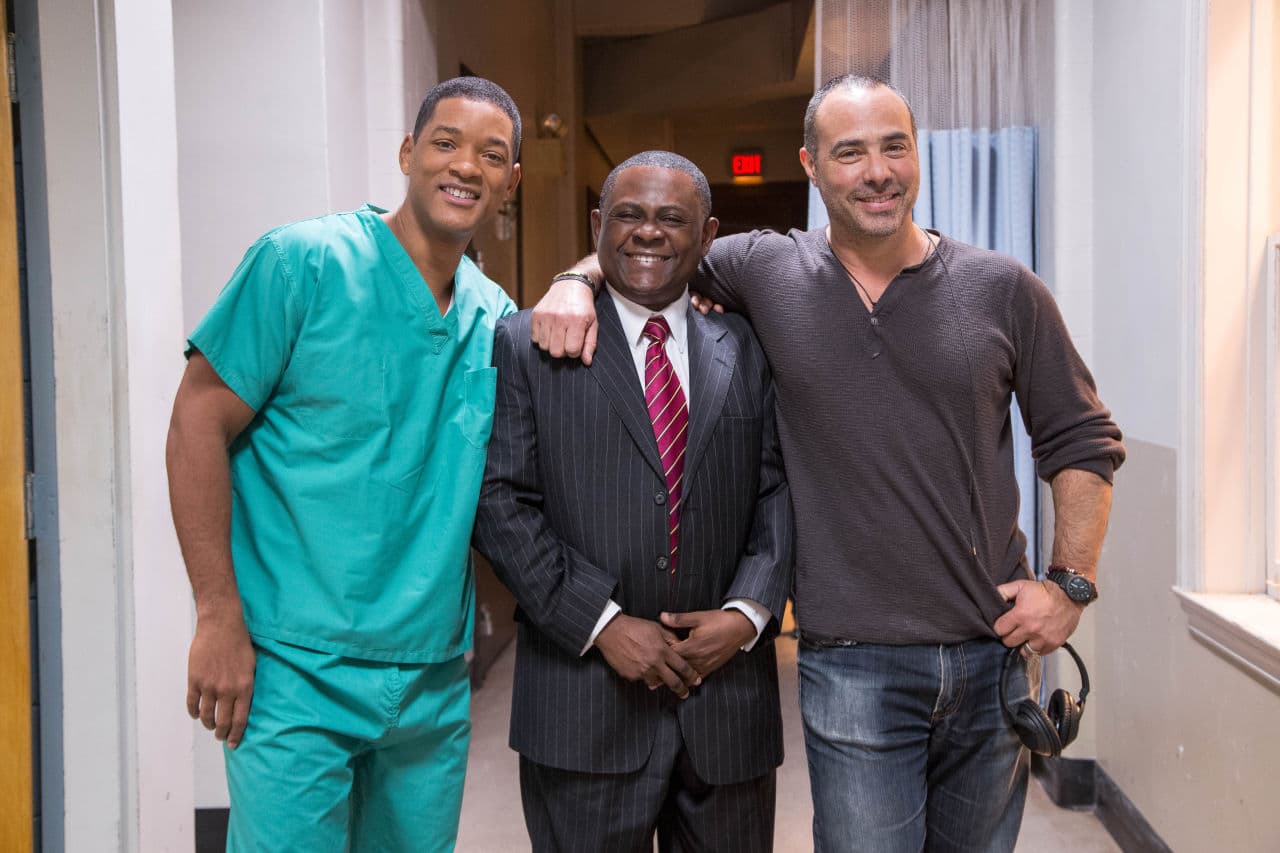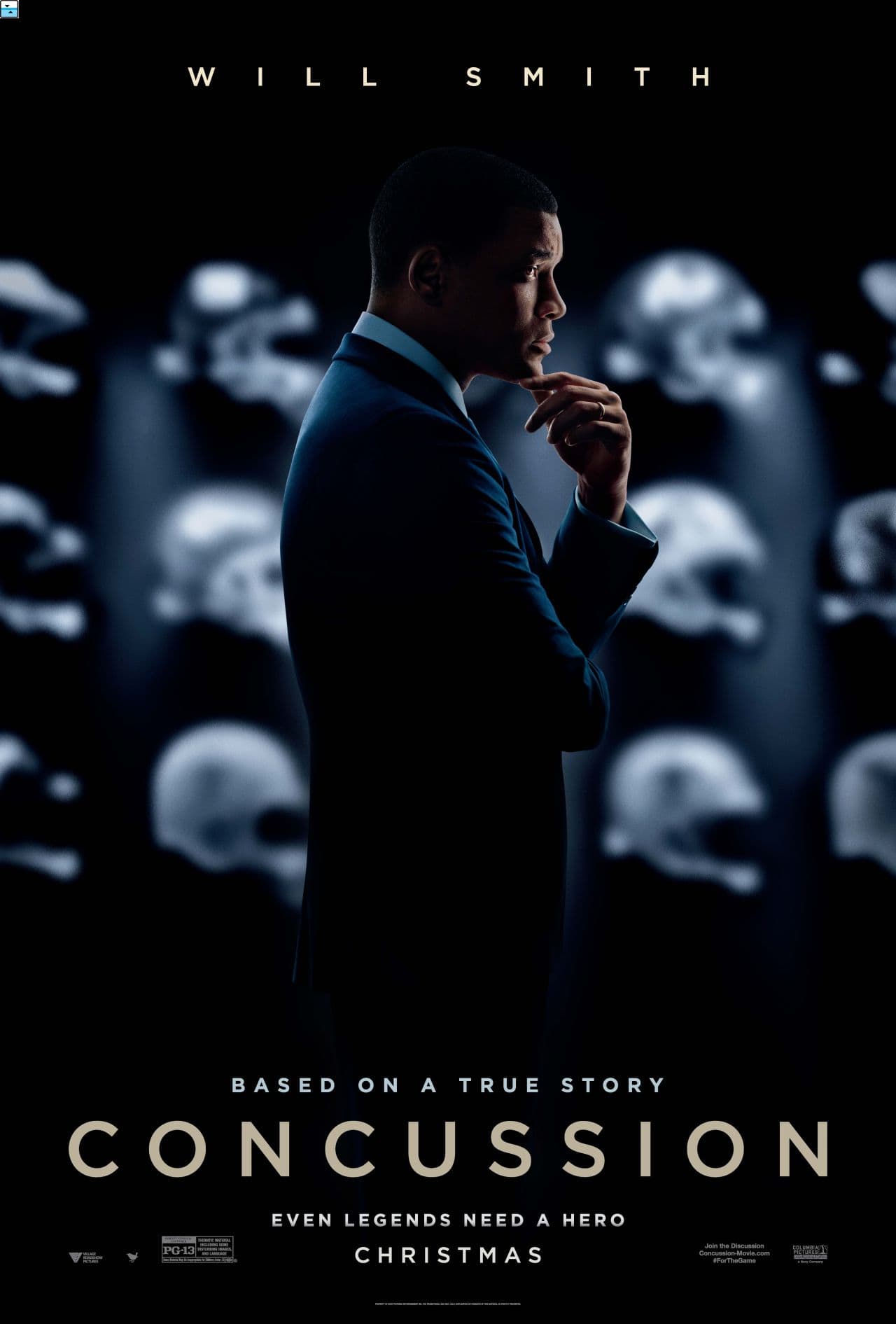Advertisement
'Concussion' Changes The Game For Players, Fans
Resume
Christmas Day will mark the official debut of a movie titled "Concussion." It tells the story of Dr. Bennet Omalu, a pathologist who immigrated to the U.S. from Nigeria. He found evidence of damage related to trauma in the brain of former Pittsburgh Steeler Mike Webster, who died at the age of 50.
"I don’t really watch football much anymore," says Peter Landesman, who directed the movie. "I know Will hasn’t watched a game all season, and I think a lot of people who see this movie feel the same way."
The “Will” to whom Peter Landesman refers is Will Smith, who plays Dr. Bennet Omalu. Landesman says Omalu is the reason he wanted to make the film.
"This is a movie that takes on an enormous corporation and an enormous cultural fabric, you know, that’s part of the American tapestry: NFL football," he says. "But at the end of the day, this is the story about a man and his journey, and I stay true to him, and he keeps me honest as a story-teller."
The NFL -- no, I haven’t heard from them at all. And I’m not, you know, checking the tires of my car, either. Not yet.
Dr. Omalu examined Mike Webster’s brain in 2002. Shortly thereafter, he published his findings and his conclusions about the relationship between the head trauma suffered by football players and diminished brain function, mood swings, violent outbursts and suicides. Meanwhile he found the same damage in the brains of various other former players.
Lots of football fans didn’t want to know what Dr. Omalu had learned. Likewise some of the players. "Concussion" dramatizes the attempts both subtle and direct to ruin the messenger who’d brought the bad news and frighten Omalu and his wife.
"Bennet was followed. He was pursued very often," Landesman says. "He would come down to his parking lot and find all four of tires of his car punctured, happened a number of times. They were terrified they’d be deported. He was essentially chased and hounded out of Pittsburgh. Took a job in rural California. You know, they had no allies. They had nowhere to turn."
A few of the people who’ve attended screenings of "Concussion" have accused Landesman of over-dramatizing some events and inventing conversations that may not have taken place. Landesman makes a distinction between film-maker and historian.
"To me, what’s great about filmmaking is you can tell the story in many ways that’s more truthful, because you’re not bound by data and ones and zeroes, and pure information," he says.
Thus Landesman didn’t hesitate to include in the film a dramatic confrontation between Dr. Omalu and Dave Duerson, a former NFL player who testified before Congress in 2007 that there was no evidence of a connection between repetitive head trauma and brain injury. In the scene, Omalu has been prohibited from presenting his evidence in a meeting Duerson is attending. Duerson tells him to go back to Africa and “get away from our game.”

In 2011, Dave Duerson shot himself in the chest. He was 51. He’d been plagued by confusion, bankruptcy and self-destructive acts. He left a note directing his family to give his brain to the researchers studying CTE, and they found the condition.
The impact of scenes like Dave Duerson’s suicide has not been lost on former players who’ve seen the film. Sports Illustrated staff writer Emily Kaplan watched "Concussion" with 70 of those men. Afterward she spoke with 47-year-old former linebacker Keith McCants in the lobby of the theater.
"He was just, he was really emotional," Kaplan says. "He was kind of hunched over on this bench over a cane and there were tears streaming down his face, and he went on this little bit of a rant, where it ended, saying, 'Look, I realize after watching this movie that we were paid to give concussions. We were paid to kill people. And if I had known that, I wouldn’t have put on the jersey.'"
Kaplan herself is a football fan, but she, too, found the movie powerful and convincing:
"You do see things that really disturb you. Here’s a doctor, and they try to discredit him because they — they being the NFL — didn’t like the research he had or didn’t want to believe it. And according to this movie, the NFL used every means possible. They claimed he was an outsider. They tried to discredit his education because he was a Nigerian immigrant. And whereas this man, Dr. Bennet Omalu, all he wanted was to find the truth. And I think one of the things that you walk away with is saying, 'Sometimes it does take an outsider to discover something like this.'"

This particular gruesome “something” has been in the news for some time. Thousands of former players sued the NFL for failing to warn them of the dangers about which the league knew, and the NFL has settled with many of them at a cost of hundreds of millions of dollars. Those developments have not made football any less popular, at least as measured by attendance and television ratings. But having seen the impact of "Concussion" on some of the former players, Emily Kaplan wonders how long that will be the case.
"Sometimes we don’t believe it until we see it," she says. "And sometimes when it’s offered in this mass-media market, and it’s going to be in trailers, in movie theaters on Christmas, and billed as this thing that you must see with your family with Will Smith, then maybe it will finally hit home."
Months ago, The New York Times reported that Peter Landesman had toned down "Concussion" to avoid objections from the NFL. In fact, he left out a particularly dramatic story. It happens that when he came to the U.S., Dr. Omalu was accompanied by a young cousin named Amobi Okoye who eventually played football at the University of Louisville. He was drafted by the NFL at the same time Dr. Omalu was making his discoveries. Omalu urged his cousin to find another line of work, but the cousin said the money was too good.
"Well, Okoye went onto some sort of good but not spectacular career with the Texans," Landesman says. "Last year, spent three months in a coma because of a head injury from football, woke up from the coma and went back to playing football with the Dallas Cowboys. So this entire ordeal was in the movie, and it’s just too much. It was too rich. Audiences didn’t believe it. So, look, you know, being a film maker is also deciding what to leave out."
I’ve seen the movie. It doesn’t feel as if anybody intimidated the director. Landesman denies that he softened the presentation, and he doubts the league will contest the truth of what he’s made.
"The NFL — no, I haven’t heard from them at all," he said. "And I’m not, you know, checking the tires of my car, either. Not yet."
Let us hope, in the spirit of the season — if for no other reason — that nothing changes in that respect.
This segment aired on December 19, 2015.
